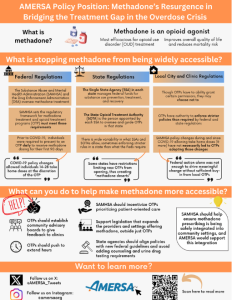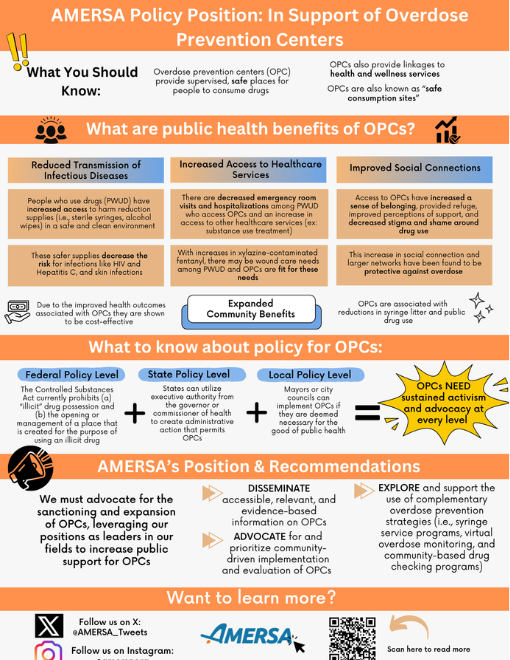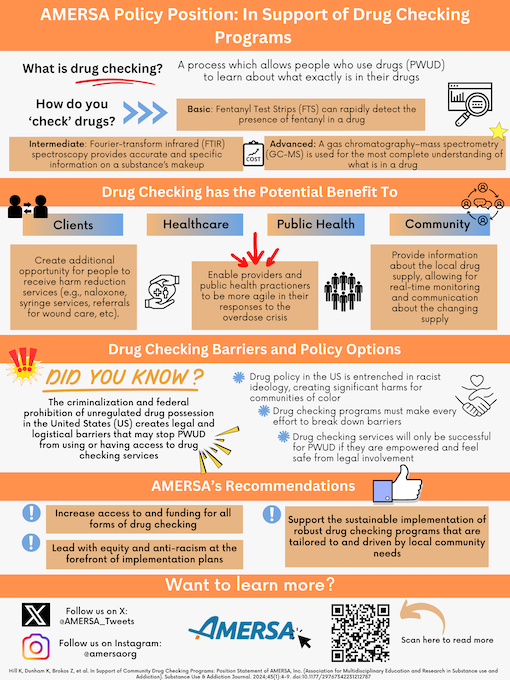AMERSA Position Statement on Methadone’s Resurgence in Bridging the Treatment Gap in the Overdose Crisis
The overdose crisis in the United States (US) has become one of the most pressing public health challenges of our time. National overdose deaths, often resulting from illicitly manufactured fentanyl and other potent synthetic opioids, exceeded 100,000 deaths in 2021 and 2022. This crisis is further underlined by the fact that Black/African American individuals have 7 times higher overdose rates compared to their white peers. Although various interventions have been deployed, the underutilization of methadone treatment remains a critical oversight in the country’s response. Methadone, a long-acting opioid agonist, has been a stalwart treatment in addiction medicine for decades. Its pharmacological properties, including its ability to occupy opioid receptors and suppress withdrawal symptoms, make it an invaluable tool in managing opioid use disorder (OUD), resulting in improved outcomes such as reduced overdose mortality, reduced opioid cravings and withdrawal, and overall improved quality of life.
AMERSA Position Statement In Support of Overdose Prevention Centers
Given increasing rates of fatal overdoses in the United States (US) and the rapidly changing drug supply, overdose prevention centers (also known as safe consumption sites) have been identified as a vital, evidence-based strategy that provide people who use drugs’ (PWUD) the opportunity to use drugs safely and receive immediate, life-saving overdose support from trained personnel. In addition to providing a safe, supervised space to use drugs, overdose prevention centers (OPCs) can house further essential harm reduction drop-in services such as sterile supplies, social services, and medical care. There are established national and international data demonstrating the lifesaving services provided by OPCs, inspiring a groundswell of advocacy efforts to expand these programs in the US. Thus, the Association for Multidisciplinary Education and Research in Substance Use and Addiction (AMERSA) endorses OPCs, in addition to other harm reduction strategies that protect PWUD. Ultimately, it is imperative to increase access to OPCs across the US and support key policy changes at the local, state, and federal levels that would facilitate urgent expansion.
More than 25% of all arrests made nationwide are related to drug offenses, impacting almost 1.2 million people and their social networks. Further, roughly 20% of people in jails and prisons across the US are incarcerated for a drug offense and millions more are under community supervision for these charges. This criminalization of drug use has negatively impacted the health and wellbeing of people who use drugs (PWUD) as incarceration is associated with many poor health outcomes. Decriminalization – a process of removing criminal sanctions for a previously criminalized behavior – of drug use is central to harm reduction as it mitigates these negative consequences of drug use and supports the health of PWUD. AMERSA supports the decriminalization of drug and paraphernalia possession for personal use for all currently illicit drugs and all associated equipment.
AMERSA Position Statement on Community Drug Checking Programs
The unregulated drug supply in the United States evolves constantly, leaving those who use drugs potentially unaware of new adulterants in their drugs. This can leave people vulnerable to serious adverse events such as fatal overdoses, wounds, and more. Without real-time data on the composition of drugs available in a community, healthcare providers and public health practitioners are left with insufficient data, making it increasingly difficult to know how to best serve people who use drugs. In this context, community-based drug checking has become recognized as an important harm reduction strategy with the potential to provide those who use drugs with more information about their supply. Thus, it is imperative to expand funding and increase access to drug checking programs in communities across the US. Key policy changes, such as those related to decriminalizing drug and drug paraphernalia possession, could improve utilization of such drug checking programs as well.
The COVID-19 pandemic and its economic, social, and emotional consequences have exacerbated the opioid crisis. Rising overdose rates and decreasing access to treatment have highlighted the inequities in access to evidence-based treatment of opioid use disorder (OUD). Buprenorphine saves lives, but rural, Black, and lower socioeconomic status patients have historically had limited access to in-person buprenorphine. Technological barriers such as lack of broadband and smartphones have prevented many patients from accessing audio-visual telemedicine buprenorphine services. With the changes in telemedicine regulations during the COVID-19 public health emergency, audio-only telemedicine (i.e. telephone based) has made buprenorphine accessible to those who need it most. Extending this practice beyond the COVID-19 public health emergency would be an important step towards mitigating the opioid public health crisis.
The Association for Multidisciplinary Education and Research in Substance Use and Addiction (AMERSA) acknowledges that racism profoundly affects persons who use alcohol and other drugs. Racism’s deadly effects compounded with other social determinants of health result in a cascade of negative impacts. The AMERSA Board of Directors (BOD) proposes an initial set of strategies to promote diversity, equity, and inclusion using a framework that speaks to four key AMERSA experiences: engagement, education, mentorship, and leadership. Through these strategies, AMERSA commits to promoting equity and inclusion to dismantle the individual, institutional, and structural racism that has permeated the United States for centuries. Abstracts of paper and poster presentations are also provided.


